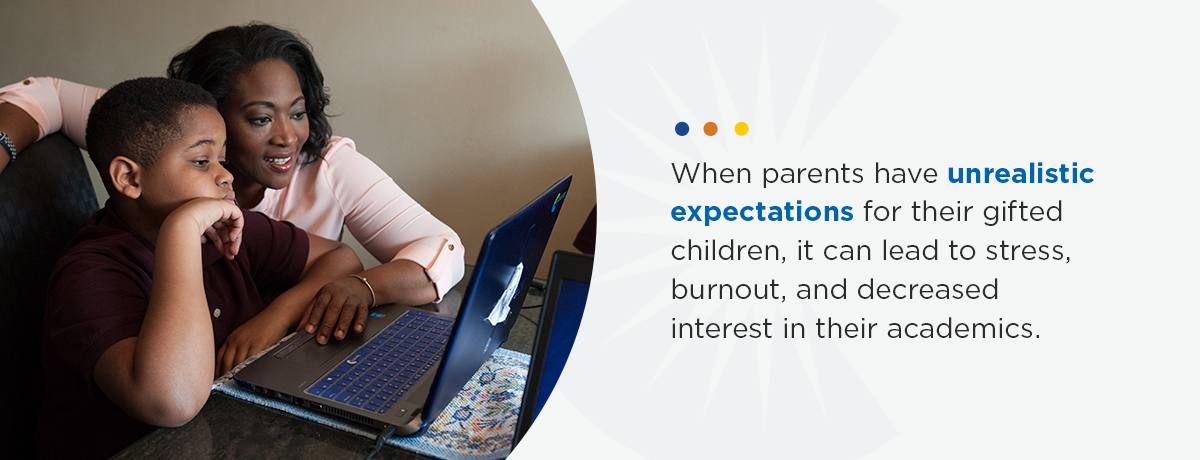Students that are gifted show great aptitude in intellectual ability. So why do these students sometimes struggle in school? Even though they show great potential, living up to the high expectations set by their teachers, parents, and themselves can lead to stress and disinterest.
If you have a gifted child struggling at school, continue reading to discover why they may fall behind.
What Makes a Student Gifted?
Historically, the term gifted refers to children with a high potential of becoming successful adults. In a school setting, the term “gifted” refers to how well students perform compared to the other students. The factors that go into identifying students who are gifted include:
- IQ scores: An intelligent quotient (IQ) test is an assessment that identifies intellectual ability, and it might be able to determine giftedness in some children. The scores that most often correspond with gifted children range between 115 and 180 or higher.
- Achievement tests: Some schools and programs will implement achievement tests to track student progress and identify students who are gifted. Even if a student doesn’t receive high grades, they could still qualify as gifted by scoring high on achievement tests.
- Talent: Some students show particular talent in an academic area, such as a third grader reading at an eighth grade level or a fifth grader who can perform high school and college-level math. Generally, gifted programs in schools are relegated to academic subjects, though students can also exhibit giftedness in areas like art and music.
Gifted and Honors programs within schools have varying qualifications. Commonly, the qualifications are set regarding the students’ achievement throughout the program, school, or district.
Are Talented Children Always Gifted Students?
Children often have varied talents and strengths, and they may not correspond with traditional academic achievement. Talented children aren’t always students who are gifted for a variety of reasons. Some reasons a talented student may not qualify for a gifted program include the following:
- Their talents don’t correspond to academics, such as students who excel in the fine arts or sports.
- They receive good grades but don’t meet the IQ or assessment qualifications.
- They might excel in a particular subject area and struggle in others.
A student who is gifted demonstrates advanced academics capabilities that require modifications to the standard curriculum to keep up with their achievement.
Five Reasons Gifted Students Struggle in School
While many people think students who are gifted get perfect grades and scores in school, that isn’t always the case. Underachievement, or a discrepancy between a student’s ability and their grades, is common among these children for the following reasons.
1. Perfection
Perfectionism is a harmful trait for many people, and students who are gifted are especially prone to experiencing perfectionism. Perfectionism is a trait that causes an individual to fixate on completing a task or achieving a goal to almost impossible standards. A perfectionist who receives straight A’s on their report card might fixate on one assignment they received a lower grade on, even though they achieved almost perfect final grades.
Unfortunately, perfectionism can lead to negative mental health problems, including anxiety, depression, and obsessive-compulsive disorder (OCD). Perfectionists often feel they are never good enough due to their own unreasonably high expectations. Children who are gifted often grow accustomed to high achievement and might slip into perfectionism when their reality falls short of their high expectations.
2. Attention Difficulties
When students who are gifted receive an education that’s not tailored to their high achievement levels, they can quickly become bored. Underachieving gifted students usually face boredom in classrooms where they are not intellectually challenged. They may demonstrate a passion for learning when home, but their grades could plummet due to a lack of interest at school.
Children who are gifted may also have attention deficit hyperactivity disorder (ADHD). Sometimes, giftedness might mask a child’s ADHD, or a teacher may miss giftedness in students with ADHD due to disruptive behaviors.

3. Unrealistic Expectations
Both students and parents can approach academics with unrealistic expectations. When students have excessively high expectations for themselves, falling short can cause them to lose interest in their education.
When parents have unrealistic expectations for their gifted children, it can lead to stress, burnout, and decreased interest in their academics. If a student believes there is no way to make their parent or guardian happy, they may give up trying altogether.
4. Social Struggles
In addition to pressures from academic and family expectations, students who are gifted may struggle in school because of social issues. Some of the issues these students can face in school include:
- Embarrassment for being different or standing out.
- Bullying from peers due to their intelligence or differences.
- Exclusion from social activities and popular groups.
- Being thought of as a show-off or teacher’s pet.
When students who are gifted experience negative social situations due to their abilities, they may downplay or mask their true potential to fit in. Social challenges for gifted students can also extend beyond school. A child who is gifted may not be as successful as they can be due to issues outside of school, such as:
- Family responsibilities, like help with childcare.
- Financial struggles or having to get a job.
- Experiencing abuse.
- Mental health struggles.
Experiencing social struggles can impact a student’s ability to perform academically.
5. Burnout
Burnout occurs when an individual experiences excessive or prolonged stress. It’s common to lose interest and energy after dealing with stressful, mundane, or overwhelming tasks for an extend period. Students who are gifted experience burnout when their expectations are too high and result in stress and anxiety.
If your gifted student shows signs of losing interest in their academics or seems resentful toward school, they may be experiencing burnout.
The emotional symptoms of burnout, such as detachment, helplessness, and cynicism, can cause students to stop caring about their school work. Burnout can also have physical symptoms, like fatigue, headaches, insomnia, and even lowered immunity.
Request More Information About the CCA Gifted Program
CCA recognizes the potential of gifted students and understands the unique struggles they may face in school. With our personalized learning plans in our gifted programs, accelerated and gifted students receive an education tailored to their needs and interests. Our qualified teachers provide close monitoring for students who are gifted in addition to end-of-year assessments.
Learn more about our gifted program today and find out how CCA can challenge your student and help them grow.



